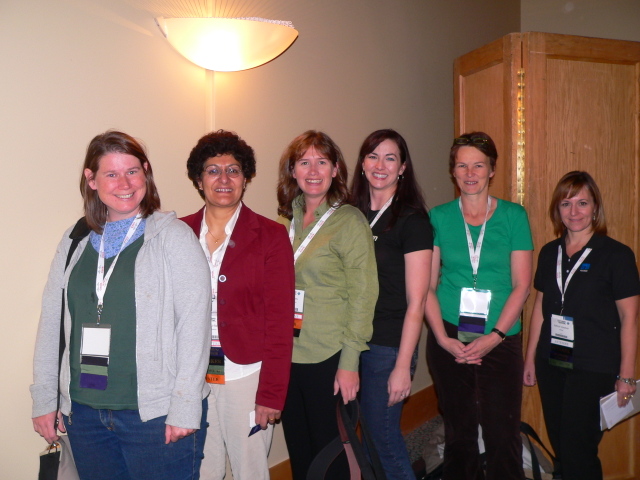One of the things I'm passionate about is encouraging women in technology. With that in mind, I'm going to talk about something that's never discussed in mixed company: crying at work. Or rather, trying desperately not to cry at work. I'll tell you how I try not to cry at work and I'll tell you how you can help someone who's trying not to cry: create space. Tell a joke, change the subject for a minute.

I cry easily. I cry when I'm frustrated, mad or hurt. I used to not worry about it until one day a roommate told me – after an argument – that when I cried he assumed I was sorry. I was so mad – I cried!
Trying not to cry has always been really hard for me. The tears come, you discretely try to wipe them off, you stare at the ceiling, you think about something else, … it wasn't until I got pregnant that I figured out how to get rid of them. Most of the time anyway.
I did once have the chance to ask a psychologist about trying not to cry. He said he could teach me through lots of role playing and different skills to just not cry. But he wouldn't want to – crying was healthy.
Crying changed when I got pregnant a couple of years ago. When I first got pregnant, if I started to cry, I couldn't stop. There's nothing worse than being in a sales meeting, arguing about whether book covers should be blue or green, and all of a sudden you're crying. And you can't stop. And everyone is looking at you. And they don't know you're pregnant, they just see you bawling about some stupid book covers. I went for a lot of walks there for a while. I think the janitor was really worried about me. Thankfully the next stage of pregnancy set in quickly. During that stage I felt like I was set apart from discussions – maybe it was the eight inches of stomach between me and them – but I just didn't really care. I mostly felt detached humor.
Feeling detached works well for not crying and I can still recreate that feeling (without getting pregnant) but it doesn't work well when you're passionate. And I'm passionate about a lot of the things I work on. I don't want to feel detached. Humor's ok, but not detachment.
So I've worked out two things that help me not cry. (Now consider that I think that the best thing would probably be just to cry and let people deal with it. I'm me. But if the other person is going to think I'm sorry, well, I guess for now I'll work on not crying. Next we'll work on teaching the world there's more reasons to cry than I'm sorry.)
The two things that help me not cry when I don't want to be crying are:
- It's not about me. I'm going to write a whole blog post about "It's not about me" but for I'll talk about it briefly here. When I get so frustrated that I'm about to cry – when I'm so upset that he doesn't understand why the covers have to be blue in order for us to be successful – I remember it's not about me. He's arguing that the covers need to be green because every company he's ever worked at, the covers have been green. And he told his kid all covers should be green. And he's never seen a blue cover – what kind of crazy people would make blue covers? And … you get the picture. (Substitute "proprietary software" and "open source" for green and blue …) So I'm not just fighting that he thinks these covers should be green – I'm fighting 20 years worth of green covers. It's not just about me and now.
- Space. If I can create just a little bit of space, I'm usually good to go. Humor is really good for this. Recently I went back to HP for a meeting and realized how much I miss the humor they inject into their meetings. There's a continuous undercurrent of good natured banter. I use that now whenever I need it. So just recently, a colleague questioned the value of my work. (Actually, I thought he questioned the value of my work. See number one, it's not all about me.) While he was trying to back peddle himself out of a hole I'd put him in, I felt those tears coming, so I clapped both hands to my chest and whispered "But it's me!" It wasn't very funny but one other person in the room laughed and I was able to chuckle, the tears were gone, and I could listen again.
In an ideal world, I think I would just cry when I felt like it. In today's world, if I start crying, I'm spending so much energy worrying what the other person is thinking and trying not to cry, that I'm no longer effectively listening or discussing. So in the interest of being able to work effectively in today's environment, I work hard not to cry.
I figured my story might help others or might encourage others to share their tips and tricks or experiences.
Related posts:
Photo by nyki_m.

